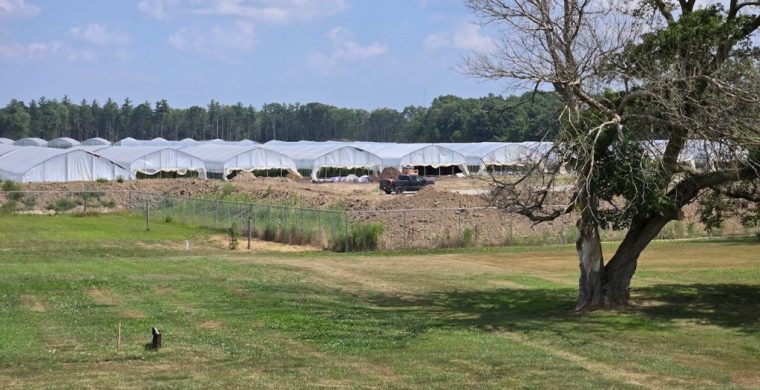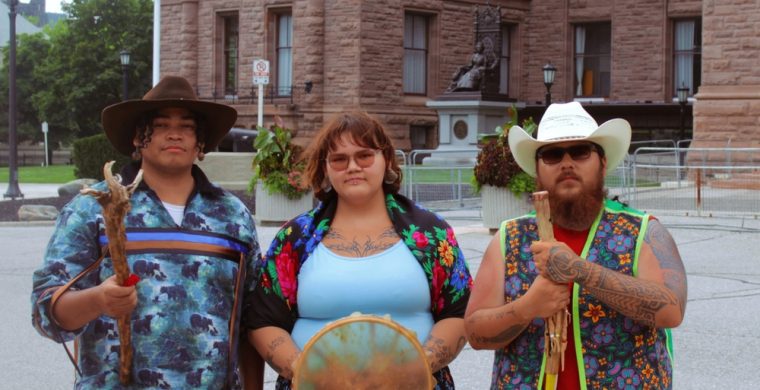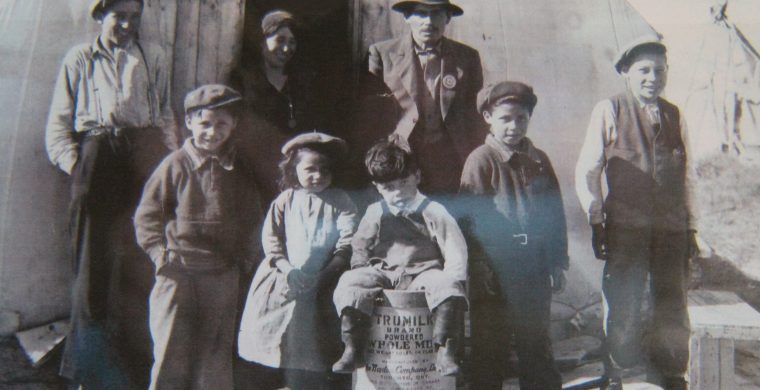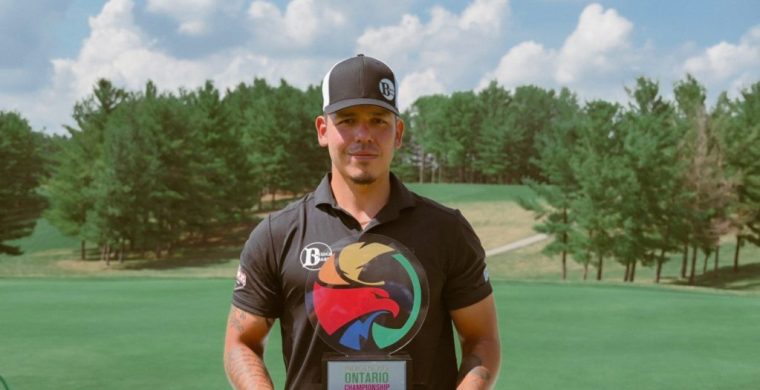Small-scale hydro demo plant proposed for Pete’s Dam Park
By Darlene Wroe, Local Journalism Initiative Reporter, Temiskaming Speaker TEMISKAMING SHORES – Could electricity generation return to Pete’s Dam Park? The founder of a company that has developed what it calls an ultra high efficiency micro hydro-turbine believes it can. It has proposed a demonstration project in Temiskaming Shores, with hopes that the model can be used by remote First Nation communities that currently rely on diesel-generated power. “This is my pet project,” said George “Sandy” Thomson, founder of Thordon Energy, in an interview at his home in Haileybury last week. “I think it’s the most important thing I’ve ever done in my life, because it’s so good for the environment and good for the First Nations remote communities.” Timiskaming First Nation (TFN) is prepared to be a partner in...
Some evacuation orders, alerts linked to Vancouver Island wildfire lifted
Some of the evacuation orders and alerts linked to the Mount Underwood wildfire on Vancouver Island have been lifted or downgraded, as firefighters report “minimal” behaviour from the blaze. The Alberni-Clayoquot Regional District, the City of Port Alberni and the Tseshaht First Nation jointly issued an update at 8 a.m. saying evacuation orders are lifted for the China Creek Campground and Headquarters Bay, which remain on evacuation alert. The update also says that the City of Port Alberni and the Tseshaht First Nation’s reserves are no longer under alert. The Cowichan Valley Regional District says it has also rescinded an evacuation order for a number of properties, noting that “the threat to life and safety has passed.” The main road access to Bamfield, B.C., remains closed for a stretch between...
Quebec government renews promise to make changes to contentious forestry reform bill
By Maura Forrest The Quebec government says it will find solutions and defuse rising tension over a forestry bill that has sparked blockades and confrontations between Indigenous protesters and industry workers. Indigenous Affairs Minister Ian Lafrenière and Natural Resources Minister Maïté Blanchette Vézina have renewed a promise to modify the proposed legislation following meetings this week with Indigenous leaders. “I am working on amendments,” Blanchette Vézina told reporters after a meeting Wednesday morning with the Assembly of First Nations Quebec—Labrador. “We want to find more consensual ways of arriving at a modern forestry regime.” The two ministers met for six hours on Tuesday with the three communities of the Atikamekw Nation and representatives of the forest industry in La Tuque, Que., about 220 kilometres northeast of Montreal. Blockades in opposition...
Multi-million dollar housing may be built at cannabis field
Multi-million dollar housing may be built next door to cannabis field By Lynda Powless Editor Six Nations could soon see one of the first 3D-printed concrete apartment buildings in the country built in an Indigenous community. Local architect Brian Porter, in partnership with a Toronto developer, is hoping to bring robotic construction to Six Nations with the building of a 30-unit housing complex on property on Fourth Line. However, the location is already home to one of the largest and smelliest cannabis fields at Six Nations. Porter outlined his project to the Six Nations Elected Council (SNEC) at its Aug. 12th session seeking approval to hook it up to Six Nations waterline. He told SNEC he plans, along with his partner Horizon Legacy, to build a $9.9-million, 30-unit pilot housing...
Families whose ancestors gave up Indigenous status sue for rights return, claim deprived of economic, education and health benefits
A proposed class-action lawsuit filed in Federal Court says the Canadian government wrongfully denies people status under the country’s Indian Act if their ancestors “voluntarily” gave up Indigenous status under laws that predate Confederation. Plaintiffs Charles Wesley, Christopher Wesley, Sharon Nicholas and Nicole Nicholas filed a statement of claim in Vancouver this month seeking damages from the federal government for “being deprived of the benefits” of status under the act. The claim says they all have “at least one direct ancestor” who was “enfranchised” under Canadian law, where they gave up their status and received the rights and privileges of Canadian citizenship. The lawsuit says their “family history of enfranchisement” means they and their children and grandchildren are not eligible to register for status, depriving them of “tangible economic, educational,...
Elected Chief says Six Nations still in state of emergency
Six Nations remains in a state of emergency due to flooding and continues to mitigate damages, while the Elected Chief says she is continuing to advocate for the community. Elected Chief Sherri Lyn Hill and CEO Tracy Brant both delivered updates to Six Nations Elected COuncil (SNEC) on events and issues happening over the past week. Elected Chief Hill read her update to the elected council on Aug. 12, touching on political meetings, support for Manitoba wildfire evacuees who have been in Ontario since the beginning of June, and the ongoing state of emergency. Elected Chief Hill said her office has secured meetings at the 2025 Association of Municipalities of Ontario (AMO) conference with the Minister of Transportation and Ontario’s Liberal, Green, and NDP leaders. Hill said SNEC’s requests to...
SN Elected Council discuss Lifelong Learning and wastewater
Six Nations’ committees are working toward reinvigorating the Lifelong Learning Task force, wastewater by laws and more. Three Six Nations Elected Council (SNEC) committees reported progress on education planning, waste management by-law consultations, and the recent Two Row on the Grand paddle at the General Council meeting on August 12. Audrey Powless-Bomberry, co-chair of the Education, Language and Culture Committee, said her group is “working on plenty of engagement with the community, people who are in the education field,” and pursuing proposals to secure more funding. She emphasized the importance of momentum, describing the work as “a long, hard process” that has “taken a lot of people a lot of work to get to this point.” Funding from Indigenous Services Canada currently covers Junior Kindergarten to Grade 12, but she...
Youth Rally celebrates walkers to Queen’s Park
By Xavier Kataquapit Writer Grassroots First Nation youth welcomed the arrival of the Mahmo Inninuwuk Wiibuseego-stamok walkers at Queens Park in Toronto on Friday August 8, 2025. The walking group completed their 22 day and over 700 km walking journey from downtown Timmins to Queens Park at a combined rally held together with First Nation youth groups Youth Rising Together and Okiniwak. The awareness walk and rally at Queen’s Park was organized by these grassroots youth movements to show their dissatisfaction of Ontario’s Bill 5 and Canada’s Bill C5. The youth walkers ceremoniously walked onto Queen’s Park at 1pm on Friday together with other youth leadership representatives. They were greeted with a traditional pipe ceremony led by Conrad Iahtail (Nahpaysh Miishenish Aisipi), of Attawapiskat FN and traditional drum performances. “It...
Six Nations holding meetings on gaming potential
The Six Nations Gaming Commission (SNGC) is looking to expand its mandate beyond the licensing of bingo and fundraisers to a possible casino. Amy Lickers, a local consultant, was hired by SNGC to find out if the community wants to see the local gaming commission mandate expanded held its first session last week. The SNGA is currently mandated by Six Nations Elected Council (SNEC) to cover licensing of bingo, radio bingo, toy bingos, 50/50 draws and fundraisers. Now the SNGC wants to look at expanding its mandate beyond tickets and fundraisers. Lickers said the focus sessions, being held, at the Six Nations community hall’s Dajoh room, will look at what the community wants to see. ‘The SNGC wants to know if the community wants to see its mandate expanded,” she...
Petition circulating to shut down cannabis fields near schools
By Lynda Powless Editor With the school year coming a petition has begun circulating demanding the federal government intervene and shut down cannabis fields licensed by Six Nations Elected Council’s (SNEC) cannabis commission located near schools. At least two fields one on Fourth Line and another on Onondaga Road at Stone Ridge are located near schools. The Fourth Line field is one of the largest known cannabis fields at Six Nations and operates under a license from the incorporated Six Nations Cannabis Commission (SNCC) a SNEC created body. With the operation of the cannabis field came a strong stench, flooding and noise. The field is located not only adjacent to the village of Ohsweken, home to the single largest populated spot in the community, but near two elementary schools and...
Where’s the best spot for the new Brantford-Brant
By Celeste Percy-Beauregard, Local Journalism Initiative Reporter, The Hamilton Spectator The search for a new hospital site in Brantford-Brant has begun. An independent task force will help Brant Community Healthcare System (BCHS) — which oversees the Brantford General Hospital and the Willett Urgent Care Centre in Paris — find the right spot. “This process is about more than identifying a parcel of land — it’s about shaping the future of care in Brantford and Brant County for generations to come,” Bonnie Camm, president and CEO of BCHS, said in a news release. Deputy premier Sylvia Jones visited the Brantford General Hospital last month to formally affirm provincial support for the functional planning phase of a new hospital. Public and expert input will help develop the criteria, which will include considerations...
Politics… what’s that?
Six Nations Elected Council (SNEC) has found a way to keep its travel costs down…at least they should be. The answer was simple. They stopped engaging in political issues. SNEC’s hasn’t been actively involved since the emergence of the new council. and its new leader. Rarely is a national or provincial political issues hitting the open council sessions and if it does the new council’s answer seems to be to send the occasional letter. The result is the community doesn’t know what the impact of Bill 5, official “An Act to enact the Free Trade and Labour Mobility in Canada Act and the Building Canada Act,” will be to Six Nations . And let’s remember cuts are clearly coming if they aren’t here already. Prime Minister Carney has said there...
Today in History
Aug 17 In 1998, an armed standoff in the Gaspe by Mi’kmaq factions and Quebec governments over native timber rights ended after a compromise deal was reached. The deal gave a total of 30,000 cubic metres of wood to Listiguj reserve. Aug 19 In 1928, Inuk sculptor Qaqaq Ashoona was born. In 2022, Prime Minister Justin Trudeau announced the nomination of Michelle O’Bonsawin to the Supreme Court of Canada, making her the first Indigenous person to be named to the high court. O’Bonsawin spent five years as a judge at the Ontario Superior Court of Justice in Ottawa. She had also taught law at the University of Ottawa and served as the Royal Ottawa Health Care Group’s general counsel for eight years. O’Bonsawin identifies as a bilingual Franco-Ontarian and an...
UNDER THE NORTHERN SKY Attawapiskat First Nation Election 2025
Xavier Kataquapit Writer My home community of Attawapiskat First Nation will be holding a local election this month on August 29. It is an exciting time not just for those living in the community but for those members, like myself, who now live and work in southern cities and towns away from the James Bay coast. This will officially be the first community election where off-reserve members who don’t reside in the community will have the opportunity to vote for their leadership. Although off reserve voting had occurred in previous elections, it was in a very limited capacity. This will be the first ever organized effort by local election officials to widely include off reserve members. Election officials will travel to Timmins on August 18, Sudbury on August 20, North...
Six Nations golfer wins provincial Indigenous tourament
By Sam Laskaris Writer John Monture Jr. was able to convincingly silence some of his critics. The Six Nations member captured the men’s title at the Indigenous Ontario Golf Championship, which concluded last Wednesday at the MontHill Golf & Country Club in nearby Caledonia. This marked the fourth year of the tournament. The event has been staged at MontHill each time. Monture Jr. had won the inaugural tourney in 2022. And though he led the field heading into the third and final round of last year’s event, he ended up in a tie for second place. Thus, he was obviously pleased he was able to maintain his composure on the final day this year and emerge as the champion. “It feels really good actually,” Monture Jr. said. “Last year I...
Rivermen hoping for success at national Presidents Cup tournament
By Sam Laskaris Writer The Six Nations Rivermen are mere days away from participating in their national Presidents Cup tournament. And Rivermen head coach Wayne Hill insists that members of the local Senior B men’s lacrosse club are in a positive frame of mind. That’s even though the Six Nations squad is on a two-game losing streak heading into its Canadian tourney, which begins Sunday (Aug. 24) and continues until Aug. 30. The Brooklin Merchants, who are rivals of the Six Nations squad in the Ontario Series Lacrosse (OSL), are hosting the national championship. All matches in the eight-team event will be held at the Iroquois Park Sports Centre in Whitby. As hosts, the Merchants received an automatic berth into the national tourney, often simply called The Prezzy. Since the...
Attack captures B championship at provincials
By Sam Laskaris Writer The Grand River Attack did end up winning a championship this past weekend. But it wasn’t the one that members of the Six Nations-based women’s lacrosse club would have ideally preferred. The Attack participated in the season-ending Women’s Major Series Lacrosse (WMSL) playoff tournament in Peterborough. All 10 entrants in the Ontario-based circuit competed at the three-day tournament, which wrapped up on Sunday. The Grand River squad entered the event hoping it would be able to challenge for the tournament’s A Division championship. The top four finishers following round-robin action advanced to the semi-finals of the A grouping. But the Attack, which posted a 2-2 round-robin mark, found itself battling in the B Division playdowns. The Grand River club ended up placing third in its grouping,...
One in seven First Nations impacted as Canada battles raging wildfires
By Sonal Gupta, Local Journalism Initiative Reporter, Canada’s National Observer As wildfires scorch Canada amid its second-worst wildfire season on record, Indigenous leaders and experts say the country’s approach remains reactive — leaving Indigenous communities disproportionately vulnerable. At a Monday press conference, federal officials reported that 707 wildfires are currently active nationwide. The extreme fire activity has strained firefighting resources, prompting Canada to deploy over 560 international firefighters from six countries alongside Canadian personnel. This situation is particularly dire for Indigenous communities. Jen Baron, a postdoctoral researcher and incoming assistant professor at the University of British Columbia’s Centre for Wildfire Coexistence, said this year’s fires are occurring in regions such as Saskatchewan, Manitoba and the Maritimes, where such large-scale activity has been less common historically. Many First Nations communities are...
Nokiiwin Tribal Council gets $4M from WSIB in new partnership
By Matt Prokopchuk, Local Journalism Initiative Reporter, TBnewswatch.com FORT WILLIAM FIRST NATION — A new partnership has been formed between a tribal council that provides a number of services to several First Nations in the region and the Workplace Safety and Insurance Board. The agreement between the Nokiiwin Tribal Council and the WSIB was announced at the council’s 19th annual general meeting on Anemki Wajiw (also known as Mount McKay) at Fort William First Nation on Tuesday. It will see Nokiiwin receive $4 million over the next four years from the WSIB to develop programming around workplace health and safety. “It’s going to give us capacity, so we’re going to be able to onboard a team to really run and develop this program from a very Indigenous lens,” said Audrey...
Quebec government tries to ease growing tension over forestry blockades
By Maura Forrest The Quebec government is trying to ease rising tensions between forestry workers and Indigenous protesters who oppose a new bill they say threatens their way of life. Natural Resources Minister Maïté Blanchette Vézina and Indigenous Affairs Minister Ian Lafrenière announced Tuesday they were meeting with three Atikamekw communities in Quebec’s Mauricie region, roughly 200 kilometres north of Montreal. The region has been the site of recent tense confrontations between protesters and industry workers over a series of blockades that have disrupted operations for some in the forestry sector. “I am very concerned about the situation,” Blanchette Vézina said Tuesday on X. “It is essential that we speak calmly and respectfully.” The Assembly of First Nations Quebec–Labrador is expected to meet with the office of Premier François Legault...












